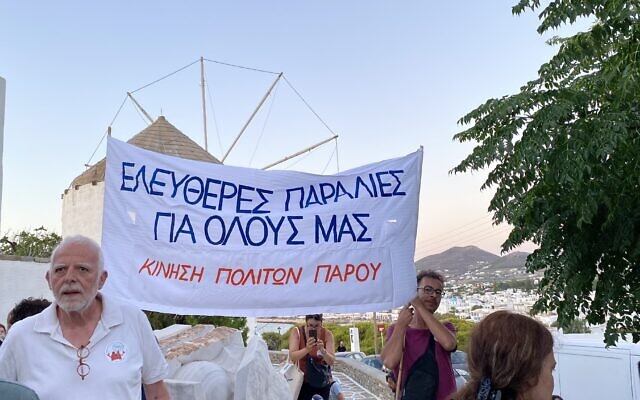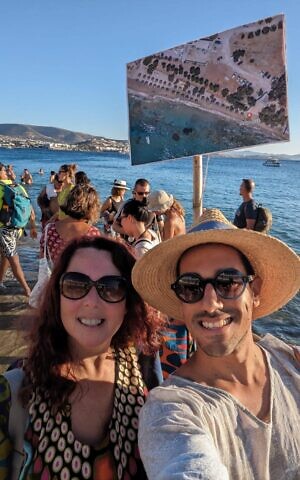PAROS, Greece — When Ronit Nesher and her husband moved to Greece several years ago, the couple specifically chose to make their new home on the island of Paros due to its tranquility and easygoing way of life. But now, that has all changed.
“As soon as the season starts, it’s all occupied by big monstrous sunbeds and huge umbrellas with loud music. It’s horrible. Everything is invaded, it’s like an occupation,” said Nesher.
“They want to turn Paros into Ibiza or Mykonos, but we don’t want it. These entrepreneurs only think about money, not about nature or the people,” she said, adding that she has now resigned herself to almost never going to the beach.
This summer, Nesher joined the Towel Movement — a group of locals who are denouncing the private takeover of the island’s public beaches. They say that some businesses are unlicensed, while others take up large stretches of sand, leaving no space for others who want to use the beach. With sunbeds going for up to 100 euros ($107), some feel deprived.
“Why should I pay for something that’s supposed to be free?” asked Kostas, a Parian who came to see the changes on his childhood beach.
Get The Times of Israel's Daily Edition by email and never miss our top stories
“To access this side of the beach, you have to pay tens of euros. On the other side, you have free access to the beach — but guess why? The water is filled with rocks,” he said angrily.

Ronit Nesher poses near Ampelas Beach on the Greek island of Paros, August 2023. (Romain Chauvet)
Through a Facebook group called Saving Paros Beaches which now has more than 12,000 members, the movement organized protests, demonstrating several times in front of sunbathing tourists who don’t always understand what’s happening.
“Protesting for a good cause always makes you feel better, whether here in Greece or in Israel,” Nesher said. “I think it’s time to make the voice of the people heard everywhere. We are our own leaders, we don’t need to follow someone corrupt or who wants to impose something on us.”
But in a country where tourism makes up almost a quarter of the gross domestic product, such demonstrations don’t sit well with the country’s conservative government, which was reelected this past June and insists it doesn’t need the protesters help in stamping out seaside misdemeanors.
“We will spare no one when it comes to respecting the legality of the beaches. Some doubted it,” but they have been proven wrong by the government’s swift and effective measures, Greek Economy and Finance Minister Kostis Hatzidakis declared last month.

Demonstrators hold a sign in Greek railing against government inaction about overtourism in Paros, Greece, August 2023. (Romain Chauvet)
Hundreds of inspections have taken place on many Greek islands, with irregularities noted and ostensibly dealt with — but there have been reports of re-occupation of the beaches when the inspectors left the islands.
“Access to the beaches was just the straw that broke the camel’s back,” said Elias Petrakis, one of the members of Paros’s Towel Movement who also created a map of beaches where allegedly illegal activities are taking place.
“All we see now in Paros are the consequences of mass tourism, and the authorities do nothing,” Petrakis said. “There is an explosion of construction, a lack of infrastructure and now we are being deprived of our beaches. Let’s not destroy our paradise for profit — otherwise, we will lose everything.”

Elias Petrakis at a demonstration against government inaction about overtourism in Paros, Greece, in 2023. (Courtesy)
Managing mass tourism

Ronit Nesher (right) and Or Kaplan demonstrating against the privatization of Paros, Greece, beaches in July 2023. (Courtesy)
Greece continues to be a popular tourist destination. The country welcomed almost 30 million visitors in 2022, and a record number of tourists is expected to arrive this year. Even though many Greeks make a living from tourism — especially since the country’s debt crisis of 2009 to 2018 — the issue of overtourism is becoming more and more of a concern for citizens.
“The priority in Greece needs to change; the country should focus more on the local people and nature. That’s why I protest to support the rights of the people, like I do when I’m coming back to Israel,” said Or Kaplan, another Israeli who now lives in Paros. He too has witnessed the impact of overtourism on the island and has now resigned himself to going only to places still undiscovered by tourists, far from the hustle and bustle.
From Paros, the movement against the privatization of beaches and mass tourism quickly spread across Greece, particularly on the islands. Locals are all complaining about the same things: short-term rentals such as Airbnb are causing rent prices to skyrocket for residents, ferries are saturating certain islands with visitors, and illegal construction is increasing and threatening the environment.
Although the two places aren’t quite identical, Kaplan believes that Greece may have something to learn from Tel Aviv, where fixed prices have been implemented for sunbeds as well as for some basic items.
“The municipality of Tel Aviv has put things in place. It’s not perfect, but it’s progress, whereas here there is no control at all, authorities don’t care. It’s sad, we are losing our paradise,” Kaplan said.

As recorded in this August 2023 photo, to have access to certain beaches of Paros, Greece, you have to pay plenty due to the privatization of the beaches. (Romain Chauvet)
For Iosif Botetzagias, professor of environmental policy at the University of the Aegean, Greece is at a turning point.
“Many people saw their island deserted for the first time in their lives during COVID and realized that it wasn’t so bad. Since I was young, every year during the tourist season, we have been told to close our eyes and not ask too many questions because that’s where the money is. But things have changed,” said Botetzagias, originally from Corfu, another tourist island. “Of course, we still need this money, but maybe enough is enough.”
Greece has just started regulating tourism at the Acropolis of Athens, where daily visitor quotas have been established to improve the visitor experience, but also to protect the country’s most visited monument. Some locals applaud the step while also noting that it was late in coming, as well as that mass tourism is only exacerbating climate change. Greece has had a worrying summer with disastrous fires, a record heatwave and historic floods.
“This issue will surely be addressed during the [municipal] electoral campaign [in October], but it will take a long time to change everything. Many entrepreneurs are very powerful and have a large network,” Botetzagias said.
Said Nesher: “I believe this is just the beginning of the movement. We must now decide how we can create a better and sustainable future for Paros and not go down this destructive path.”


